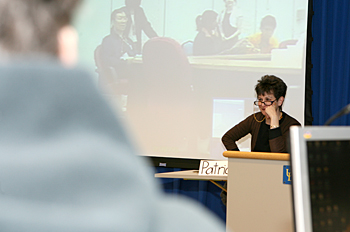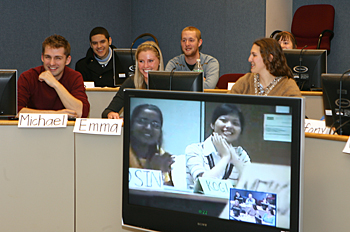
Devine is a student and teaching assistant in a course, “Young, Privileged and Global: American and Malaysian Dimensions of University Life,” taught by Patricia Sloane-White, assistant professor of anthropology.
Thanks to modern technology the course is designed to be a virtual international, cultural experience, involving 21 UD students and 21 Malaysian students at the Universiti Tunku Abdul Rahaman (UTAR) in the capital city of Kuala Lumpur.
The students meet and discuss being “young, privileged and global” in terms of each country's cultural customs, reading the same materials on such topics as globalization, modernization, culture, religion, economy and social life in both societies. Also, they watch films, music videos, TV commercials, read magazines, look at fashions and generally examine trends among young people, Sloane-White said. They also write essays, which are posted for others to read.
Once a week on Monday nights (Tuesday morning at UTAR) UD students connect with their Malaysian counterparts to discuss subjects such as family values, race, gender, media and global youth cultures. In between weekly sessions, they meet online on a class blog where they can discuss and debate these and other topics.
“Today's students are comfortable and accustomed to using technology through popular blogs, such as Facebook and YouTube, and I thought a class involving an exchange and dialog between UD students and Malaysian students would be a valuable experience for students in both countries. We also are videotaping the exchange classes as a teaching and research tool,” she said.
“UTAR is a young, dynamic university, about five years old. The students are first-generation college students for the most part, whose parents are shopkeepers or run small businesses,” Sloane-White said. “Now that they have a university like UTAR, many students are getting the chance to go to college in this vigorously developing country.”
The course officially began in the spring semester, but there were two pre-course sessions for about a dozen UD students who were on campus for Winter Session and for all the Malaysian students who are already in school.
“The students are honest when talking to each other, and already some cultural differences have emerged,” Sloane White said. “For example, American students were surprised to learn that some Malaysian parents physically punish their children for poor performance in school.”
“The UD students thought it might be awkward using mikes and talking to the students, but we have a huge screen where we can see them clearly as well as talk to them, and it worked out very well,” Devine said.
“It's an amazing experience,” said Michael Bartley, a senior majoring in East Asian Studies, who was an exchange student in Japan. “Once we became accustomed to taking part in the video conference, we had a good dialog going with the Malaysian students. I am very excited about this course and am glad I attended the first sessions.”
During the test-run classes, all the students introduced themselves to each other and were asked to describe in a few words how they perceived American students.It was an eye-opener, according to Devine. The Malaysian students described American students as “determined,” “outgoing,” “good looking” and “proactive.” Americans described themselves as “self-centered,” “materialistic” and focused on “individuality.” “It was very surprising and a different perspective,” Devine said.
Bartley said another topic was the American dream, and the Malaysian students asked what American students were doing individually to make the dream come true and to bring about racial equality. “It made us all stop and think,” Bartley said.
The online essays are another source of communication. “You put thoughts down, which are challenged and you start to rethink them,” he said.
Devine said the goal of the course is real understanding of each other and to overcome stereotyping. “The barriers are already breaking down between the students, and we are freely communicating with each other, laughing together and getting to know each other,” she said.
The international classroom got its impetus when Sloane-White, whose expertise involves Southeast Asia and East Asia and Islam and Islamic modernity, applied for a grant last year from UD's College of Arts and Sciences through Dean Tom Apple's Transformational Education Initiative. Last summer she visited UTAR to meet with her colleagues, Au Yong Geok Lin and Chong Eu Choong, to discuss the course and get the needed equipment installed.
A CD-ROM is being made of the class that can used as a teaching tool for faculty and as a research tool for students who can do follow-up interviews and dialogues via e-mail, Sloane-White said.
A graduate of Amherst College, Sloane-White, who came to UD in 2002, has a master's degree from Princeton University and a doctorate in social anthropology from the University of Oxford and has spent several years in Malaysia doing research and as a postdoctoral fellow. She is the author Islam, Modernity and Entrepreneurship among the Malays.
Article by Sue Moncure
Photos by Kathy Atkinson


